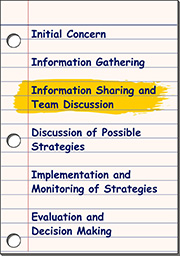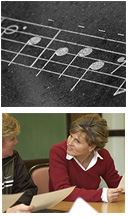What are the stages of the pre-referral process and what do they involve?
Page 6: Stage 3: Information Sharing and Team Discussion
 Once all of the relevant information has been collected, the next stage of the pre-referral process, information sharing and team discussion, can begin. In this stage, the team actually meets to begin its review of the information collected to date and to start discussing ideas and interventions—including type and intensity—that may help the student.
Once all of the relevant information has been collected, the next stage of the pre-referral process, information sharing and team discussion, can begin. In this stage, the team actually meets to begin its review of the information collected to date and to start discussing ideas and interventions—including type and intensity—that may help the student.
Typically, pre-referral teams are composed of a diverse set of individuals (e.g., general education teacher, school counselor, reading specialist) who have experience using and designing instructional techniques to address the needs of students. To establish a collegial atmosphere, team members share information in an effort to promote student success in general education classrooms. The number of people on the team varies depending on the needs of the student being referred; however, each person on the team should have a contributing role.
| Standard Team Members | Role |
| General education teacher | May identify a student who is having academic or behavioral issues
May implement the suggested intervention or consult with other staff members who might provide small-group or classroom assistance |
| Administrator | Provides the underlying support (e.g., collaboration, planning) and the organizational structure of the teams |
| School psychologist or educational assessor (diagnostician) | Conducts individual or small-group observations, screenings, and academic diagnostic assessments |
| Parents | Share knowledge about the student’s strengths and needs
Relate information about the family’s cultural background Suggest strategies that have worked with the student in the past Implement strategies in the home and support the student |
| Optional Team Members | Role |
| Students | Share strengths, likes, dislikes, learning preferences, and other unique needs |
| Special education teacher | Assists the general education teacher in developing plans for individualization of instruction in the general education classroom |
| ESL teacher | Identifies the language needs of the student and works with the team to make sure all of those language needs are met |
| School counselor | Reviews student records with the team
Plans with the classroom teacher and support staff to target the learning and behavioral needs of the student |
| Reading specialist | Provides instructional supports or individual or small-group instruction for reading
May collaborate with the general education teacher on instructional methods |
| Grade-level teachers | May plan, share, or exchange methods, materials, and instructional practices that work among diverse learners in the general education classroom |
| Health professional | May be asked to determine whether sensory acuity or health difficulties are contributing to, or causing, the initial concern
May provide health-related assistance to students who need it |
Keep in Mind
In order to ensure that pre-referral meetings run efficiently, it may be necessary for the team to assign additional roles to its members. These might include a facilitator, note-taker, timekeeper, or meeting coordinator.
Information sharing and team discussions during pre-referral meetings are structured so that all involved can share their perspectives. Many schools use specific forms during pre-referral meetings to ensure that all of the appropriate information has been gathered, reviewed, and discussed and that all of the steps in the pre-referral process are followed. Any forms used during this stage should include information about:
 Specific concerns that prompted the referral
Specific concerns that prompted the referral- Student’s strengths, talents, and interests
- Student’s skills compared to those of his or her classroom peers
- Setting or situation in which the concern developed
- Previously attempted strategies or interventions
- Best times to observe the student to see the behavior of concern
Pre-referral at Macy Middle School
Stage 3: Information Sharing and Team Discussion

Mrs. Marks shares her major referral concerns about Jeremy (i.e., that he doesn’t turn in his homework, that he doesn’t focus on his independent work, and that he is frequently inattentive in class) with the team, and explains how these behaviors are interfering with his progress.
The team consists of Jeremy’s mom, the school counselor, Mrs. Marks, and several of Jeremy’s other teachers. At this point the team does not require the involvement of a school administrator or the school psychologist, though they may join the team later if the need arises. The group discusses Jeremy’s strengths (e.g., he is compliant, loves music, and is a leader in band class) and reviews the data that Mrs. Marks has collected. They talk about whether there were other issues that might be interfering with Jeremy’s performance, such as attendance or changes in his home environment. Reports from other teachers support Mrs. Marks’s concern and further indicate that this problem is not isolated to her classroom. Once everyone has discussed the issues and agreed on the priorities, the team defines their top concern as:
Turning in homework on time. “On time” is defined as “on the day it was due”; at present Jeremy is only turning in 60% of his homework, and most of the time it is turned in late.
In addition to considering factors about the student, the team should reflect on any external issues that might be influencing the student’s performance or behavior. For example, the team might try to ascertain whether or not the concern is due to:
- Insufficient instruction and practice
- A mismatch between the student’s skill level and the classroom curriculum
- Differences in background knowledge and experiences between the student and the dominant classroom culture
- Differences in academic or behavior expectations between home and school
- Inadequate classroom management techniques
For Your Information
The pre-referral team should always begin with a discussion of the student’s strengths, including those indicated by the parents. In this way, the team will concentrate its attention on what the student can already do, what the student’s interests are, what motivates the student, and what areas the student is already succeeding in. Taking a moment to first recognize the student’s abilities is a way for the group to remain focused on potential solutions rather than concentrate exclusively on the student’s problem.